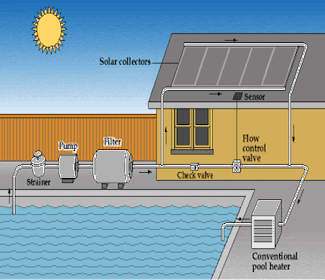Solar Pool Heaters
Keeping pool water at a comfortable temperature, especially in areas where temperatures get cool at night (or even during the day), can be expensive. Gas and electric pool heaters consume a lot of energy, which is not only expensive, but contributes to air pollution and climate-changing greenhouse gas emissions. Installing a solar pool heater can drastically reduce the cost of heating a swimming pool.
Solar pool water heaters have been common in southern areas of the country that experience lots of hot, sunny days for a long time; it simply makes sense to use the ever-present energy of the sun to heat the water rather than rely on expensive utility energy. Recently, pool owners in ever-northern climates have started to turn to solar heating as a way to reduce energy usage and lighten the environmental impact of their swimming pools.
Solar pool heaters are becoming cost-competitive with gas and heat pump pool heaters, and once installed have very low operating costs. As a bonus, solar water heating is the most cost-effective form of solar energy in most areas, and can serve as a 'gateway' to further renewable energy applications in the home.
How Solar Pool Heating Works
Heating the water in a swimming pool with solar is actually a very logical application. The pool itself becomes the thermal storage for the heating system, and the pools' existing pump for filtering water will also circulate the water through the solar collectors.Most solar pool heating systems are fairly basic, and contain the following:
- Solar Collector: The device water is circulated through to be heated by the suns' heat.
- Filter: Removes debris from the water before it's sent through the collector(s).
- Pump: Circulates water through the filter, solar collector, and returns it to the pool.
- Flow-Control Valve: An automatic or manual device that diverts pool water through the solar collector (or keeps it from going through the collector if it doesn't need further heating).
Pool water is already being circulated from the pool through the filter and back to the pool; in a solar heater, the water is pumped through the solar collectors in an additional step to be heated. During periods of extreme heat, the collector(s) can also be used at night to cool overheated water by circulating the water through them at night to keep a comfortable temperature and avoid the water quality issues that can arise if the temperature is too high.
The most important part of the solar heating system, the collector, comes in a variety of materials. For pools in warmer areas where it never freezes, a simple unglazed collector system will suffice. Unglazed collectors have no glass covering, and are typically made of rubber or plastic; their simple design and inexpensive materials make them less expensive.
A glazed collector system is made from copper tubing on an aluminum plate with a glass covering. This more expensive system works better in colder areas, because the glazed collector, in conjunction with heat exchangers and transfer fluids, are more efficient at capturing the sun's heat. This type of solar collection system is also the type most commonly used to heat water for the home.
Either kind of collector system, glazed or unglazed, should have freeze protection if used in colder climates that experience temperatures below 42 degrees Fahrenheit. Freeze protection uses an antifreeze solution as a heat-transfer fluid instead of the actual pool water to avoid damaging the collectors.
Solar Pool Heating Costs
Now for the important question: How much is this solar pool heater going to cost? It can obviously vary depending on the type of system and size of the pool, but a general figure is between $3,000 and $4,000 to purchase and install. Remember, most of the cost of solar heating is upfront; solar pool heaters typically have a payback period of between 1.5 and 7 years depending on local energy costs. Solar heaters will usually last longer than gas or heat pump heaters (10 to 20 years if properly maintained) with little regular maintenance. Most importantly, the energy solar heaters use comes directly from the sun, and it is completely free.Imagine the feeling of kicking back in the luxuriously warm waters of your swimming pool, knowing that the same sun you're basking under was responsible for heating it.




































































